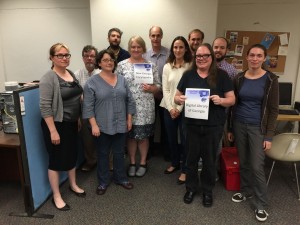
We are excited to announce our new partnership with the Pine Mountain Regional Library and welcome the Pine Mountain Regional Library Collection to the DLG.
The Pine Mountain Regional Library Collection includes photographs from scrapbooks submitted to Georgia Power’s Champion Home Town contest in 1952 and 1953. The photos document the town’s progress in the areas of education, industry, recreation, youth, clubs and societies, and include brief written progress reports. The reports and photographs present a snapshot of a small town through the eyes of its community. The collection also includes 1955 and 1957 issues of The Callaway Beacon, a weekly magazine published for the employees and families of the Callaway Mills Company in LaGrange, Georgia.
Cynthia Kilby, the director of the Pine Mountain Regional Library, says that the collection “provides a nice snapshot of life in a small town during the 1950s…It shows community pride and the development boom that occurred after World War II.” She adds that the reports in the scrapbooks were eye-opening. “The narratives listed community improvements. It was startling to read what some of the goals were, such as every home having indoor plumbing by a certain year. That is something we take for granted now.”
Digitized as part of the DPLA’s Public Library Partnerships Project (PLPP), the Pine Mountain Regional Library Collection is one of our newest resources featuring materials from public library collections. Kilby notes “We don’t have an archives in the community, so this kind of material isn’t readily available except through this program.” We would like to thank the Pine Mountain Regional Library for collaborating with the Digital Library of Georgia to make its collection available for digitization, and hope that you enjoy looking through the Pine Mountain Regional Library Collection!


